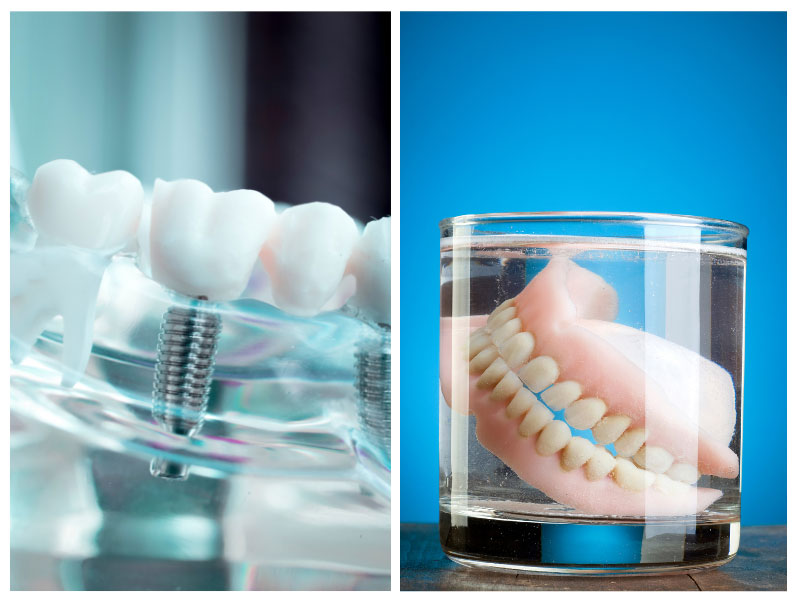Dental Implants vs. Dentures

Losing teeth can significantly impact your quality of life, affecting your ability to eat, speak, and confidently smile. Fortunately, advancements in dental technology have provided two popular solutions for replacing missing teeth: dental implants and dentures. Both options offer unique benefits, but choosing between them can be challenging. This article will explore the key differences between dental implants and dentures to help you make an informed choice that suits your needs.
Dental Implants: A Permanent Solution
Dental implants consist of a titanium post. The post is surgically installed into the jawbone. It acts as an artificial tooth root. The post integrates with the surrounding bone through osseointegration, providing a stable prosthetic tooth or crown foundation.
Durability and longevity are the two primary advantages of dental implants. If you take good care, dental implants can last a lifetime, which makes them a long-term investment in oral health. Dental implants provide a reliable and permanent solution, unlike dentures, which may need to be replaced or adjusted periodically.
Additionally, dental implants closely mimic the look, feel, and function of natural teeth. They offer excellent stability and can easily restore your ability to bite and chew. Dental implant-supported crowns or bridges are custom-designed to match your natural teeth, ensuring a seamless and aesthetically pleasing result.
It is important to note that dental implants require a certain amount of healthy jawbone to support the implant. If the bone is insufficient, a bone grafting may be necessary to build up the bone density. This additional step can prolong the overall treatment process. However, advancements in implant technology, such as mini implants, have made it possible for some patients with limited bone density to still be candidates for implant treatment.
Dental implant surgery is generally performed in multiple stages. After the implant is placed, a healing period is necessary to allow the implant to integrate with the bone. Once the integration is successful, an abutment is attached to the implant, and a customized prosthetic tooth or crown is affixed to the abutment. The process requires careful planning and collaboration between the dentist and dental laboratory to achieve optimal results.
Dentures: A Removable and Cost-Effective Option
Dentures have been a popular choice for tooth replacement for many years. They consist of artificial teeth attached to a removable acrylic base on the gums. Dentures can replace multiple missing teeth or even a full arch of teeth. One of the key advantages of dentures is their affordability compared to dental implants. Dentures are typically less expensive, making them a more budget-friendly option for those with financial constraints. This cost-effectiveness can make dentures attractive, especially for patients needing extensive tooth replacement.
Dentures can be fabricated relatively quickly, and adjustments can be made easily. This means that you can have functional teeth relatively quickly, which is particularly beneficial for individuals who require immediate tooth replacement. Dentures are also non-invasive and do not require any surgical procedures. This makes them suitable for patients who may not be ideal candidates for dental implant surgery due to medical conditions or insufficient bone density. If your jawbone has deteriorated over time, dentures can still be an option for restoring your smile.
However, dentures do have some drawbacks. They may not provide the same level of stability as dental implants, particularly for lower dentures. It is not uncommon for lower dentures to shift or move during eating or speaking, causing discomfort or embarrassment. Denture adhesives can help improve stability but may not provide a completely secure fit. Dentures also require regular maintenance and occasional adjusting to ensure a proper fit as the jawbone changes over time. Additionally, while modern dentures are designed to look natural, some patients may find that they do not feel as natural as dental implants. The sensation of wearing a removable appliance in the mouth can take some time to adjust to.
Choosing the Right Option for You
When deciding between dental implants and dentures, it is crucial to consider the following factors:
Your oral health needs
Dental implants may be a better option for you if you have other dental problems, such as gum disease. Dentures can be more difficult to keep clean if you have other dental problems.
Your lifestyle
If you are active and participate in sports or other activities that require much chewing, dental implants may be a better option for you. Dentures can be more likely to come loose during these activities.
Your budget
Dental implants are more expensive than dentures. However, dental implants can last a lifetime, while dentures may need to be replaced every few years.
Your preferences
Some people prefer the look and feel of natural teeth, while others prefer the convenience of removable dentures. It is important to consult with a qualified dentist to determine the best treatment option for you. The dentist will comprehensively evaluate your oral health, assess your bone density, and discuss your goals and preferences. They will also be able to help you understand the costs and risks of each treatment option.
Here are some additional factors that can help you make the right decision:
Durability
Dental implants are more durable than dentures and can last a lifetime. Dentures may need to be replaced every few years.
Naturalness
Dental implants look and feel more natural than dentures. Dentures may be slightly visible when you smile or speak.
Stability
Dental implants are more stable than dentures and are less likely to slip or shift. Dentures can be more likely to come loose during activities such as chewing or talking.
Maintenance
Dental implants require less maintenance than dentures. Dentures need to be cleaned and adjusted more often.
Conclusion
Both dental implants and dentures offer effective solutions for replacing missing teeth. The best option for you will depend on your individual needs and preferences. By considering your specific needs and consulting with a qualified dentist, you can determine the best option to restore your smile and regain confidence.

